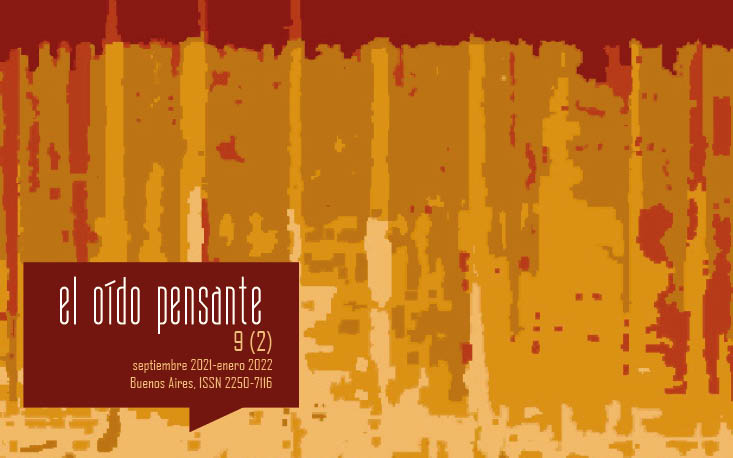Sound, Musical and Social Issues in Pandemic and Viralization Times
Abstract
The conjugation of the terms that give the present research its title requires, on the one hand, the consideration of three aspects and, on the other hand, a necessary condition to take into account. The first of these aspects derives from the nature of the health crisis, its global scope and glocal repercussions on human life. The second, more of a theoretical nature, is that linked to music as a human action, a cultural fact and a consumer product in our (post)modern world. The third, of a methodological nature, is that the correlation presented is not a given reality, but rather that it is happening, and, the condition to keep in mind is viralization. In this sense, and from an interpretative approach, musical manifestations and sound expressions are observed, described and analysed as viralized facts in virtuality in order to give an account of the socio-cultural relations that are established from their circulation according to the theoretical perspectives offered by the disciplines and sciences that make music an object of study. Viralization is presented as a condition that allows us to rethink the discursive in virtuality as well as our existence in it.Downloads
References
Attali, J. (1995). Ruidos. Ensayo sobre la economía política de la Música. Madrid: Siglo XXI
Agawu, K. (2012). La música como discurso. Aventuras semióticas en la música romántica. Buenos Aires: Eterna Cadencia Editora
Blacking, J. (2006). ¿Hay música en el Hombre? Madrid: Alianza Editorial.
Chadwick, Hilary & Knussen, Sue (Productores) y West, Peter (Director). (1996). Leaving home. Orchestral Music in the 20th Century. EMI Classic/Trevor Leighton https://www.youtube.com/watch?v=lSjtPZF_aQk
Dussel, E. (2011). Filosofía de la liberación. México: Fondo de Cultura Económica
Escobar, A. (2005). Más allá del Tercer Mundo. Globalización y Diferencia. Bogotá: ICAHN – Universidad del Cauca.
Fernández, A. (2008). Las lógicas colectivas. Imaginarios, cuerpos y multiplicidades. 2da. Ed. Buenos Aires: Bilbos.
Finnegan, R. (2002). ¿Por qué estudiar la música? Reflexiones de una antropóloga desde el campo. Trans Revista Transcultural de Música, (6), 1-26 http://www.sibetrans.com/trans/articulo/224/por-que-estudiar-la-musica-reflexiones-de-una-antropologa-desde-el-campo
González, J. (2008). Los estudios de Música Popular y la renovación de la Musicología en América Latina: ¿la gallina o el huevo? Trans Revista Transcultural de Música, (12), 1-13 http://www.sibetrans.com/trans/articulo/100/los-estudios-de-musica-popular-y-la-renovacion-de-la-musicologia-en-america-latina-la-gallina-o-el-huevo
Hormigos, J. (2012). La sociología de la música. Teorías clásicas y puntos de partida en la definición de la disciplina. Barataria. Revista Castellano-Manchega de Ciencias Sociales, 14, 75-84 http://www.redalyc.org/articulo.oa?id=322127624005
Lupasco, S. (1968). Nuevos aspectos del Arte y de la Ciencia. Madrid: Ediciones Guadarrama
Martínez, J. & Figueroa, A. (2014). Evolución de los conceptos y paradigmas que orientan la gestión ambiental ¿cuáles son sus limitaciones desde lo glocal? Revista Ingenierías Universidad de Medellín, 13 (24), pp. 13-27 https://www.redalyc.org/pdf/750/75036967001.pdf
Mayer-Schönberger, V. & Cukier, K. (2013). Big Data. A revolution that will transform how we live, work and think. Boston-New York: Eamon Dolan Book-Hougton Mifflin Harcourt.
Merriam, A. (1980). The Anthropology of Music. Illinois: Northwester University Press.
Mugglestone, E. (1981). Guido Alder’s “The Scope, Method, and Aim of Musicology” (1885): An English translation with an Historic-Analytical commentary. Yearbook for traditional Music, 13, 1-21 http://www.jstor.org/stable/768355
Nettl, B. (1992). Recent directions in Ethnomusigology. En: Meyers, H. Ethnomusicology: An Introduction. (375-399). Londres: McMilan Press.
Sachs, C. (1966). Musicología comparada. La música de las culturas exóticas. Buenos Aires: EUDEBA.
Sanz, J. (2017). ¿Musicología o Investigación Musical? Estésis, (3), 22-31 https://revistaestesis.edu.co/index.php/revista/article/view/17
Scott, D. (2009). The Ashgate Research Companion to Popular Musicology. England: Ashgate
Schafer, M. (2013). El paisaje sonoro y la afinación del mundo. Barcelona: Intermedio.
Small, Ch. (1999). El Musicar. Un ritual en el espacio social. Trans Revista Transcultural de Música, (4), 1-16 http://www.sibetrans.com/trans/articulo/252/el-musicar-un-ritual-en-el-espacio-social
Weber, M. (2002). Economía y Sociedad. México: Fondo de Cultura Económica
Zemelman, H. (1992). Los Horizontes de la Razón I. Dialéctica y apropiación del presente. Barcelona: Antrhopos; México: El Colegio de México























